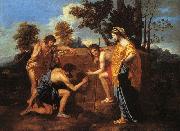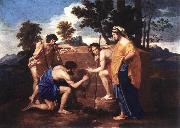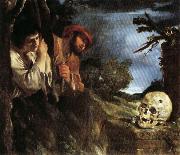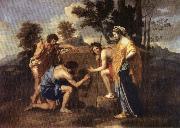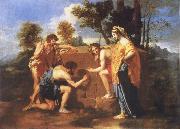
|
Nicolas Poussin
|
|||
|
|
|||
| French 1594-1665 Nicolas Poussin Galleries The finest collection of Poussin's paintings, in addition to his drawings, is located in the Louvre in Paris. Besides the pictures in the National Gallery and at Dulwich, England possesses several of his most considerable works: The Triumph of Pan is at Basildon House, near to Pangbourne, (Berkshire), and his great allegorical painting of the Arts at Knowsley. The later version of Tancred and Erminia is at the Barber Institute in Birmingham. At Rome, in the Colonna and Valentini Palaces, are notable works by him, and one of the private apartments of Prince Doria is decorated by a great series of landscapes in distemper. Throughout his life he stood aloof from the popular movement of his native school. French art in his day was purely decorative, but in Poussin we find a survival of the impulses of the Renaissance coupled with conscious reference to classic work as the standard of excellence. In general we see his paintings at a great disadvantage: for the color, even of the best preserved, has changed in parts, so that the harmony is disturbed; and the noble construction of his designs can be better seen in engravings than in the original. Among the many who have reproduced his works, Audran, Claudine Stella, Picart and Pesne are the most successful. | |||
|
|
|||
|
Et in Arcadia Ego Nicolas Poussin6.jpg Painting ID:: 2130 |
1638-40 Musee du Louvre, Paris | ||
|
|
|||
|
Nicolas Poussin
|
|||
|
|
|||
| French 1594-1665 Nicolas Poussin Galleries The finest collection of Poussin's paintings, in addition to his drawings, is located in the Louvre in Paris. Besides the pictures in the National Gallery and at Dulwich, England possesses several of his most considerable works: The Triumph of Pan is at Basildon House, near to Pangbourne, (Berkshire), and his great allegorical painting of the Arts at Knowsley. The later version of Tancred and Erminia is at the Barber Institute in Birmingham. At Rome, in the Colonna and Valentini Palaces, are notable works by him, and one of the private apartments of Prince Doria is decorated by a great series of landscapes in distemper. Throughout his life he stood aloof from the popular movement of his native school. French art in his day was purely decorative, but in Poussin we find a survival of the impulses of the Renaissance coupled with conscious reference to classic work as the standard of excellence. In general we see his paintings at a great disadvantage: for the color, even of the best preserved, has changed in parts, so that the harmony is disturbed; and the noble construction of his designs can be better seen in engravings than in the original. Among the many who have reproduced his works, Audran, Claudine Stella, Picart and Pesne are the most successful. | |||
|
|
|||
|
Et in Arcadia Ego Nicolas Poussin52.jpg Painting ID:: 10108 |
1637 Oil on canvas 185x121cmLouvre | ||
|
|
|||
|
GUERCINO
|
|||
|
|
|||
| Italian Baroque Era Painter, 1591-1666 best known as Guercino or Il Guercino, was an Italian Baroque painter from the region of Emilia, and active in Rome and Bologna. Guercino is Italian for squinter, a nickname that was given to him because he was cross-eyed. He is especially noted for his many superb drawings. Guercino was born at Cento, a village between Bologna and Ferrara. By the age of 17 he was associated with Benedetto Gennari, a painter of the Bolognese School. By 1615 he moved to Bologna, where his work earned the praise of an elder Ludovico Carracci. He painted two large canvases, Elijah Fed by Ravens and Samson Seized by Philistines, in what appears to be a stark naturalist Caravaggesque style (although it is unlikely he had been able to see any of the Roman Caravaggios first-hand). They were painted for Cardinal Serra, Papal Legate to Ferrara. The Arcadian Shepherds (Et in Arcadia ego) was painted in 1618 contemporary with The Flaying of Marsyas by Apollo in Palazzo Pitti. His first style, he often claimed, was influenced by a canvas of Carracci in Cento. Some of his later pieces approach rather to the manner of his great contemporary Guido Reni, and are painted with more lightness and clearness. Guercino was esteemed very highly in his lifetime. He was then recommended by Marchese Enzo Bentivoglio to the Bolognese Ludovisi Pope, Pope Gregory XV. His two years (1621-23) spent in Rome were very productive. From this stay date his frescoes of Aurora at the casino of the Villa Ludovisi and the ceiling in San Crisogono (1622) of San Chrysogonus in Glory; his portrait of Pope Gregory (now in the Getty Museum, and, what is considered his masterpiece, The Burial of Saint Petronilla or St. Petronilla Altarpiece, for the Vatican (now in the Museo Capitolini). The Franciscan order of Reggio in 1655 paid him 300 ducats for the altarpiece of Saint Luke Displaying a Painting of the Madonna and Child (now in Nelson-Atkins Museum of Art, Kansas City). The Corsini also paid him 300 ducats for the Flagellation of Christ painted in 1657. | |||
|
|
|||
|
Et in Arcadia Ego new4/GUERCINO-522649.jpg Painting ID:: 30549 |
mk68 Oil on canvas 32 1/4x25 1/4" Rome,National Gallery of Art of the Past 1618-1622 Italy | ||
|
|
|||
|
POUSSIN, Nicolas
|
|||
|
|
|||
| French Baroque Era Painter, 1594-1665 French painter and draughtsman, active in Italy. His supreme achievement as a painter lies in his unrivalled but hard-won capacity to subordinate dramatic narrative and the expression of extreme states of human passions to the formal harmony of designs based on the beauty and precision of abstract forms. The development of his art towards this end was focused on the search for a point of equilibrium and synthesis between the forces of the Classical and the Baroque around which most critical debate in Rome was concentrated during the 1630s. Poussin did not aspire to the classicism of Raphael's idealized human forms or Michelangelo's re-embodiment of the physical splendours of the antique world, nor did he attempt to vie with the bravura and energy of Annibale Carracci's treatment of Classical mythology in the Galleria of the Palazzo Farnese in Rome. Equally he was not concerned with the illusionistic effects and heightened emotionalism of Baroque artists such as Pietro da Cortona and Lanfranco. He was concerned above all with interpreting his subject-matter, whether Classical or religious, and telling a story with the greatest possible concentration of emotional response, | |||
|
|
|||
|
Et in Arcadia Ego new4/POUSSIN, Nicolas-585926.jpg Painting ID:: 30580 |
mk68 Oil on canvas Paris,Louvre 1650 France | ||
|
|
|||
|
Nicolas Poussin
|
|||
|
|
|||
| French 1594-1665 Nicolas Poussin Galleries The finest collection of Poussin's paintings, in addition to his drawings, is located in the Louvre in Paris. Besides the pictures in the National Gallery and at Dulwich, England possesses several of his most considerable works: The Triumph of Pan is at Basildon House, near to Pangbourne, (Berkshire), and his great allegorical painting of the Arts at Knowsley. The later version of Tancred and Erminia is at the Barber Institute in Birmingham. At Rome, in the Colonna and Valentini Palaces, are notable works by him, and one of the private apartments of Prince Doria is decorated by a great series of landscapes in distemper. Throughout his life he stood aloof from the popular movement of his native school. French art in his day was purely decorative, but in Poussin we find a survival of the impulses of the Renaissance coupled with conscious reference to classic work as the standard of excellence. In general we see his paintings at a great disadvantage: for the color, even of the best preserved, has changed in parts, so that the harmony is disturbed; and the noble construction of his designs can be better seen in engravings than in the original. Among the many who have reproduced his works, Audran, Claudine Stella, Picart and Pesne are the most successful. | |||
|
|
|||
|
Et in Arcadia Ego new16/Nicolas Poussin-622959.jpg Painting ID:: 40452 |
mk156 1638-39 Oil on canvas 85x121cm | ||
|
|
|||
|
Also Buy::. For Following Paintings / Artists / Products, Please Use Our Search Online: |






